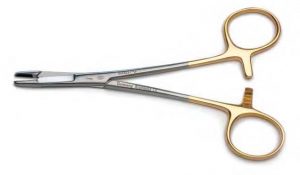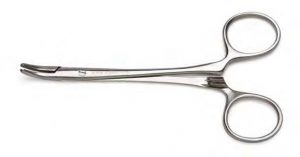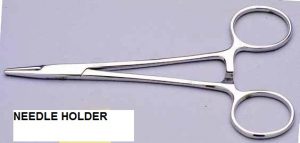The Needle holder used for the approximation of tissue during the surgical procedure with the help of a surgical sterile suture. The use of these instruments categories into different needle holder types by tissue sizes, nature of the tissue, adult or pediatrics, etc. what is the most important part of a needle holder?
The instruments with rachet lock at the user end. The surgeon can hold with thumbs and middle finger and supports with the index finger.
Operating end of the instruments with serration and stout blades
Used to hold the suture without slipping and to drive in the correct direction.
Hold the curved needles in the third part of the needle for better results. This grips enhance the user experience and complete the task on or before time
The Needle pierced into the tissue in the clockwise or anticlockwise direction and hold it with thumb forceps to avoid needle stick injury
Sometimes referred to as needle drivers, the instrument mainly rings handled, similar to hemostats. The tip with smaller jaws which are shorter and thicker. These instrument hold needles which are attached to sutures. These instruments are also available in a variety of lengths and styles and may be curved or straight. Instruments have serration in the jaw to prevent excessive wear of the instrument.
How it is made?
 Needle Holder
Needle HolderThese instruments mainly made from tungsten carbide granules in cobalt or other metallic paste. Holders with tungsten carbide insert normally identified with gold plated handles. The inserts can be replaced as they wear down, which prolongs the life of the needle holder and defrays the replacement cost of an entire instrument.
Examples of needle holders: Mayo-Hegar, Crile -wood, Olsen-Hegar, Collier, and Webster.
These suturing instruments can also have spring handles which allow the user maximum results
with a minimum rotation of the wrist and hand. Most spring handled needle
holders will have a lock or latch to secure the needle and are used in surgical
procedures requiring delicate suturing in tight or poorly exposed areas. Spring handled
needle holders may also contain replaceable inserts. An example of a spring-handled
the needle holder is a Castroviejo, 7 or 9 inch.
Types of Needle holder
Mayo Heger needle holder
Olsen Hegar
Crile wood
Webster
Microvascular needle holder
Halsey
Par
Neivert
Gillies
Swedish
Cooley
Parkhouse
Castroviejo
Ryder
Ryder type intracardiac
Mathieu
Julian
Heany Needle Holder
Derf
Metzenbaum
Gillies Sheehan
Castroviejo Microsurgery type
Castroviejo with lock
Microneedle holder
Microneedle holder with round holder
Converse
Bihrle needle holder and clamp
Wangensteen
Stratte
Sarot
Mayo-Hegar needle holders
Mainly used to hold needles
They may also be placed in the sewing category.
Needle holders with scissor
 Needle Holders with Scissor-Gillies Type
Needle Holders with Scissor-Gillies TypeGillies
Parkhouse
Olsen Hegar needle holders with scissors at the middle of the instrument to cut the suture

Thanks a lot Beautiful description especially for the beginner